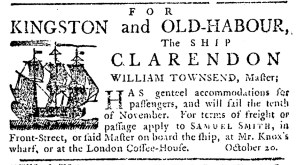What was advertised in a colonial American newspaper 250 years ago today?

“For terms of freight or passage apply … at the London Coffee-House.”
The Clarendon prepared to sail from Philadelphia to Kingston and Old Harbour in Jamaica on November 10, 1773. In advance of the ship’s departure, newspaper advertisements promoted “genteel accommodations for passengers” and solicited cargo for the voyage. Those notices continued until the day the Clarendon was scheduled to leave port, appearing in the November 10 edition of the Pennsylvania Journal. By then, neither Samuel Smith, the merchant who sponsored the voyage, nor William Townsend, the captain, probably did not accept freight that would cause delays by taking too long to load, but perhaps welcomed passengers who waited until the last minute. Townsend likely gathered letters to deliver to correspondents in Jamaica for as long as the ship remained in port. The advertisement advised that anyone with business for the Clarendon should apply to Smith “in Front-Street,” the captain “at Mr. Knox’s wharf, or at the London Coffee-House.”
It was not that only advertisement in that issue of the Pennsylvania Journal that listed the London Coffee House as one of the locations designated for meeting with masters of vessels to conduct business. A notice for the Lovely Lass, departing for Jamaica under the command of Andrew Waid before the end of November, directed readers “to CRAIG and MORRELL, or the said Master, at the London Coffee-House.” Similarly, the Lydia, under the command of Thomas Dean, “WILL sail with all convenient speed” to Liverpool, “having part of her cargo ready to go on board.” To arrange freight or passage, readers needed to contact “Jeremiah Warder and Sons, said master on board, or at the London Coffee-House.” Another ship, the Charming Nancy, would depart for Jamaica under the command of Charles Biddle on December 1. A familiar refrain instructed readers to “apply to MATTHIAS ASPDEN, or said Master on board, or at the London Coffee-House.”
Not every advertisement adorned with a woodcut depicting a ship at sea made reference to the London Coffee House, but four out of ten in that edition of the Pennsylvania Journal listed that landmark as one of the places to meet with merchants and captains to arrange for freight or passage. Readers did not have to reside in Philadelphia to realize that the London Coffee House was an important gathering place for conducting business during the era of the American Revolution. Advertisements testified to how often merchants and captains frequented the establishment to meet with associates and customers.
